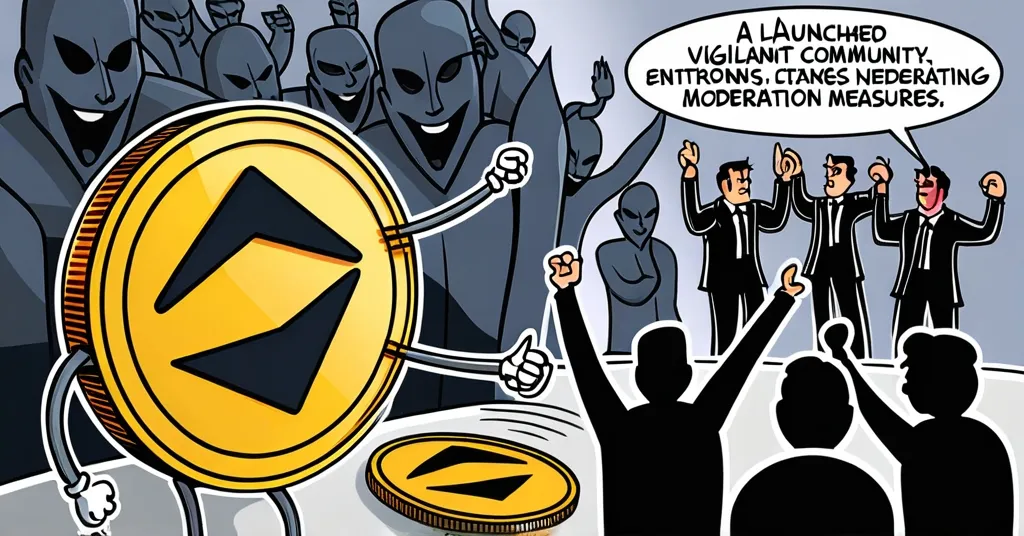Racist Meme Coins Surge: Ye’s Swasticoin Sparks Debate on Crypto Moderation

It’s Not Just Ye: Racist Meme Coins Promoting Extremist Ideologies Proliferate
The cryptocurrency world continues to grapple with the surge of racist meme coins, a troubling trend highlighted by Ye’s (formerly Kanye West) proposed “Swasticoin.” This issue underscores the broader challenge of moderating offensive content on decentralized platforms, sparking a debate on the balance between freedom and responsibility.
- Ye announces “Swasticoin” and hints at “YZY” token
- Solana Foundation explores in-app filtering
- Vitalik Buterin critiques low-quality meme coins
- Pump.fun enables unchecked token creation
- Trump’s “Official Trump” coin declines 78%
Ye’s announcement of “Swasticoin” on social media made waves across the crypto community. His proposal to launch a token named after a Nazi symbol, and his later hint at a “YZY” token as a workaround for Shopify’s restrictions on his Yeezy store, raised eyebrows and concerns. Ye’s plan to retain 70% of the token’s supply for himself suggests a financial motive behind the move, rather than a genuine ideological stance. This development, coupled with his history of controversial actions, including attempts to monetize Nazi imagery through merchandise, highlights the potential for blockchain to be exploited for harmful purposes.
The proliferation of racist meme coins is not limited to Ye’s actions. Over the past year, tokens such as “Hitler Musk,” “HITLER,” and “Groyper” have emerged, targeting online extremist communities and spreading harmful messages. These coins exploit the permissionless nature of blockchain technology, which allows anyone to create tokens without permission. This freedom, a cornerstone of decentralization, also enables the spread of offensive content, challenging the crypto community to find a balance between maintaining this ethos and preventing harm.
The Solana Foundation, recognizing this issue, has explored potential solutions. Austin Federa, the foundation’s head of strategy, suggested in-app filtering as a way to screen out offensive tokens. “In-app filtering could be a potential solution,” Federa noted. However, implementing such measures on a decentralized platform like Solana poses significant technical challenges, as it requires modifying the very nature of the system’s openness.
Ethereum co-founder Vitalik Buterin has also weighed in on the issue, expressing his concerns about the rise of low-quality meme coins. “I have zero enthusiasm for projects driven by scams, rugpulls, or fleeting excitement that ultimately disappoints investors,” Buterin stated. His critique underscores the need for the crypto industry to prioritize projects that offer real value and innovation, rather than those that merely shock and offend.
Platforms like Pump.fun have contributed to the proliferation of meme coins by allowing token creation without oversight. This ease of access empowers innovation but also facilitates the spread of harmful content. It’s a double-edged sword that the industry must navigate carefully.
Even high-profile figures like President Trump have entered the meme coin arena. His “Official Trump” token, launched before his second inauguration, has seen a significant decline, dropping 78% from its peak. With 80% of its supply held by CIC Digital, an entity linked to Trump, this example illustrates how the allure of quick profits can overshadow the potential for real impact within the crypto space.
The rise of racist meme coins raises serious questions about the future of blockchain technology. While some advocate for stricter moderation to prevent the spread of extremist ideologies, others argue that any form of censorship goes against the decentralized nature of crypto. It’s a delicate balance that the industry must navigate as it seeks to grow and gain mainstream adoption.
This situation also presents an opportunity for education. By explaining the risks and potential of blockchain technology, the crypto community can help shape public perception and policy. It’s crucial to highlight the positive aspects of decentralization, such as financial freedom and privacy, while also acknowledging the challenges that come with it.
As the crypto world continues to evolve, the issue of racist meme coins is not going away anytime soon. The industry must come together to find solutions that preserve the core principles of decentralization while also preventing the spread of harmful content. It’s a tall order, but essential for the long-term success and adoption of blockchain technology.
Key Takeaways and Questions
- What prompted Ye to announce the launch of “Swasticoin”?
Ye’s announcement of “Swasticoin” followed his controversial social media posts, possibly as a response to Shopify’s restrictions on his Yeezy store and as a means to monetize Nazi imagery.
- How are racist meme coins exploiting blockchain technology?
Racist meme coins exploit blockchain’s permissionless nature to launch tokens with offensive names and imagery, targeting online extremist communities and spreading harmful ideologies.
- What solutions are being considered to moderate offensive content in the crypto space?
The Solana Foundation is exploring in-app filtering to screen out offensive tokens, though implementing such measures in a decentralized system remains challenging.
- What is Vitalik Buterin’s stance on meme coins associated with racist themes?
Vitalik Buterin has criticized such meme coins, calling for higher-quality projects and expressing zero enthusiasm for projects driven by scams or fleeting excitement.
- How do platforms like Pump.fun contribute to the proliferation of meme coins?
Platforms like Pump.fun allow anyone to launch a token without oversight, facilitating the creation and spread of meme coins, including those with racist themes.
- What are the potential financial motives behind Ye’s proposed token launch?
Ye plans to keep 70% of the token’s supply for himself, suggesting that the launch may be more about financial gain than promoting an ideology.
- What is the current status of President Trump’s “Official Trump” meme coin?
The “Official Trump” meme coin is down 78% from its peak, with 80% of its supply held by CIC Digital, an entity linked to the president.



